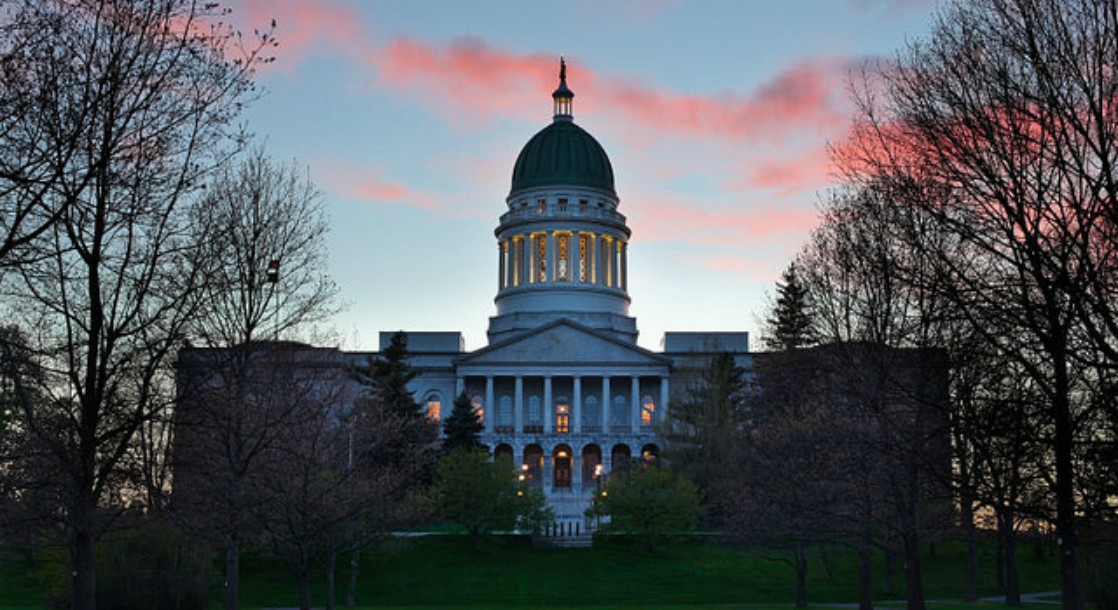Lead photo via Flickr user M. Fox
A final vote in Maine’s House of Representatives to ovverride Gov. Paul LePage’s veto of recreational cannabis regulations failed to garner the two-thirds support necessary on Monday, sending legislators back to the drawing board in January, and leaving Pine Tree State smokers with no option but homegrown or black market bud to satiate their legal weed needs.
According to the Portland Press Herald, Maine’s House voted in favor of LD 1650 by a vote of 74-62, 17 votes shy of the two-thirds consensus needed to overturn Gov. LePage’s veto, and 10 votes less than the bill’s pre-veto passing late last month.
Now, thanks to a cannabis sales moratorium blocking the state’s voter-approved legal weed system until at least February of next year, lawmakers have little more than three months to either craft and pass a brand new set of cannabis regulations, concede to the voter-approved plan, or extend the existing legal weed ban.
“I feel like we legalized gasoline, but not gas stations,” Rep. Martin Grohman, an Independent who supported the veto override, told reporters after the failed vote.
And with Gov. LePage suggesting at every turn that he is still skeptical of bucking federal regulations and allowing legal weed sales in the first place, Maine Representatives who supported LD 1650 are still uncertain as to what the future holds.
“You know, 74-62 is a good victory in a basketball game, but it’s not enough to overcome a veto,” said Rep. Roger Katz, a Republican who co-chairs the legislative special committee that wrote LD 1650, to the Portland Press Herald. “We will regroup and we will sit around and try to figure out where the heck we go from here, and I hope somebody has some bright ideas because right now I don’t have any.”
In the days since Gov. LePage’s veto, some of Maine’s leading cannabis advocates have voiced support for the Gubernatorial strong-arming, saying that LD 1650 undermined or completely eliminated key aspects of the voter-approved legalization framework passed last November.
But while legal weed activists assume that the regulations they approved with last year’s ballot measure will take effect soon enough, Gov. LePage has spent his week adding fuel to the prohibitionist fire, even going as far as to ask permission from the country’s most outspoken anti-cannabis government official, Attorney General Jeff Sessions.
“I’ve got a letter in to Jeff Sessions, and I’m waiting for a response, on whether or not the federal government will enforce federal law,” Gov. LePage said in a radio interview with WGAN on Monday.
After everything the Attorney General has said to demonize cannabis in his short time in office, we’re guessing the nation’s top cop isn’t going to respond with a rousing invitation to set up recreational dispensaries, grow houses, and extraction facilities across New England.
In line with Gov. LePage’s extremely precautious approach to legal weed, Republican Rep. Kenneth Fredette has been vocal about pushing to extend Maine’s current cannabis sales moratorium, a suggestion that was once again shot down by House legislators on Monday. Still, all indications suggest that Fredette will continue to push for extended delays when lawmakers reconvene in January.
“There is no way rulemaking is going to be done in time for a Feb. 1 date,” Fredette told reporters after Monday’s vote.
Maine legislators have for months voiced opposition to certain regulations approved by voters in last November’s election, including provisions that would allow for cannabis consumption lounges and drive-thru dispensaries, prompting the writing of LD 1650 in the first place. But if lawmakers are adamant about actually regulating legal weed in a timely fashion, they might be wise to reconsider the voter approved regulations, or face further vetoes from Gov. LePage or extended sales moratoriums that delay the program indefinitely.
Governor LePage will hold office until the beginning of 2019 and could technically prevent Mainers from realizing their recreational cannabis dreams until then.











